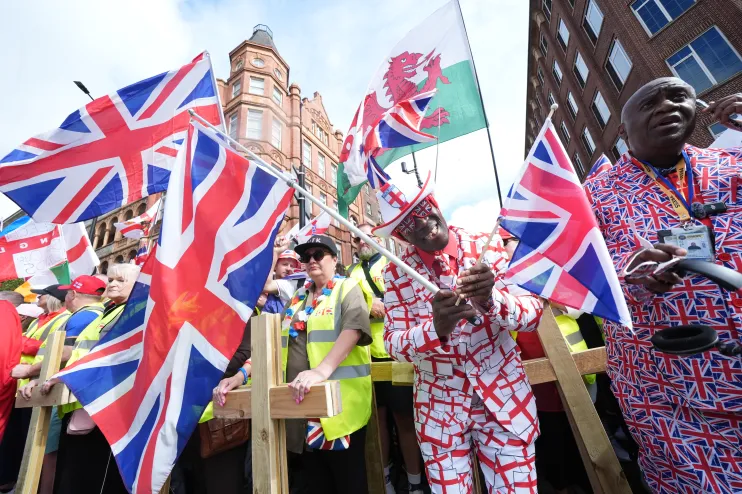By Christian May
Copyright cityam

I struggled to identify the most significant elements of Saturday’s ‘Unite the Kingdom’ march in London. Was it the fact that 150,000 (mostly) ordinary people took to the streets in a (mostly) peaceful protest against large-scale immigration?
Or was it that they were called to do so by a man who has served multiple prison sentences for assault and fraud? Was it the sight of a former Inspector Morse spin-off actor calling for people who shut down free speech to be put to the sword?
Was it a decidedly out of tune singer caterwauling about Starmer being a traitor and a warmonger? Perhaps it was the world’s richest man beaming in via video from the US and calling for the British government to be overthrown.
The fallout has been no less bizarre. Elon Musk’s X platform has gone into overdrive with a tsunami of AI-slop showing Tommy Robinson leading a nation to freedom, with many such posts containing absurd lies about the size of the crowd – lies amplified by Musk himself.
It would be easy, or at least comforting, to dismiss the entire spectacle as nasty, populist paroxysm; a mere moment in the sun for agitators, grifters and racist egomaniacs. But while I choose to dismiss the sight and sound of Tommy Robinson and his ragtag bunch of camp followers, the wider significance of the march cannot be ignored.
Trevor Phillips, the broadcaster and former chair of the Equality and Human Rights Commission, observed that “this was no gathering of white supremacists” – featuring as it did, a performance of Jerusalem by a black gospel choir. He even suggested that Lowry could have painted the scene and called it “Middle Britain on a day out in London” and he made a particular effort to understand and explain the social and political factors that drove so many people to an event of this nature.
Tellingly, middle Britain’s champion, Nigel Farage, was nowhere near the event, though he can be viewed as either a cause or potential beneficiary of it. Without a doubt, the large turnout at the march is impossible to disconnect from Reform’s dominant polling position, but Farage knows that any association with Robinson and his unpleasant friends would be deeply damaging.
Is it possible to ignore Robinson (his sub-par oratory, his ego and opportunism, his criminal past and his obvious inadequacies) without writing off those who chose to march behind him? I’d suggest it’s important to do exactly that. And Farage, more than any other politician, will be judged by his ability to achieve this.
The arrival, therefore, of Danny Kruger in Farage’s ranks is fortuitously timed. The defection of a respected and thoughtful Tory MP, tasked with preparing Reform for government, puts distance between Reform and the wilder fringes of Saturday’s rally.
We should all hope that the distance increases over time.



